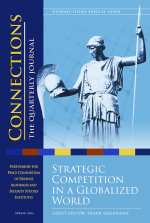This article explores the geopolitical and geostrategic importance of the Black Sea region within the complex dynamics of major-power competition, focusing primarily on the interests and strategies of the United States, China, Russia, and other regional players. It highlights the region’s major threats and challenges, ranging from military threats and hybrid operations to socio-economic and ecological concerns. These multifaceted challenges are leveraged by key stakeholders to advance their interests, further complicating the strategic landscape. This complex geopolitical environment, fraught with risks and competition, underscores the need for a nuanced understanding of the dynamics at play. The article introduces the concept of strategic trilemmas in the Black Sea region, involving the active participation of Türkiye, Ukraine, and pro-Western littoral states (Romania, Bulgaria, and Georgia) on one side, with Russia on the opposing side. Addressing the region’s challenges requires a comprehensive approach to promote stability, security, and cooperation. While Russia’s influence remains a concern, the potential for reducing its dominance and increasing cooperation in the Black Sea region offers bilateral and multilateral collaboration opportunities in this crucial geopolitical theater.
Reviewed article
Navigating the Trilemma of (In)security: Strategic Competition in the Black Sea Region
Article statistics
Bibliography
“Belt and Road Initiative,” World Bank, March 29, 2018, https://www.worldbank.org/en/topic/regional-integration/brief/belt-and-road-initiative.
“Georgia: Statement by the Spokesperson on the Intention of Russia to Establish a Naval Base on Georgia’s Internationally Recognised Territory,” European Union External Action, October 6, 2023, https://www.eeas.europa.eu/eeas/georgia-statement-spokesperson-intention-russia-establish-naval-base-georgia%E2%80%99s-internationally_en.
Chitadze, Nika, “ENC Analysis – Geopolitical Interests of China in the South Caucasus: The Example of China-Georgia Relations,” European Neighbourhood Council, August 31, 2021, http://encouncil.org/2021/08/31/enc-analysis-geopolitical-interests-of-china-in-the-south-caucasus-the-example-of-china-georgia-relations/.
Coffey, Luke, and Can Kasapoğlu, “A New Black Sea Strategy for a New Black Sea Reality,” Policy Memo (Hudson Institute, February 2023), https://www.hudson.org/foreign-policy/new-black-sea-strategy-new-black-sea-reality.
Cropsey, Seth, George Scutaru, Harry Halem, and Antonia Colibasanu, Strategic Nexus: The Black Sea, Great Power Competition, and the Russo-Ukrainian War (Yorktown Institute, New Strategy Center, 2023), 12, https://newstrategycenter.ro/wp-content/uploads/2023/06/YI_NSC_Monograph.pdf.
Hamilton, Daniel, and Gerhard Mangott, eds., The Wider Black Sea Region in the 21st Century: Strategic, Economic and Energy Perspectives (Washington, D.C.: Center for Transatlantic Relations, 2008), https://ciaotest.cc.columbia.edu/wps/ctr/0016283/f_0016283_14081.pdf.
Nikitin, Mary Beth D., “Russia’s Nuclear Weapons: Doctrine, Forces, and Modernization,” CRS Report R45861 (Washington, D.C.: Congressional Research Service, April 21, 2022), https://crsreports.congress.gov/product/pdf/R/R45861/16.
Nistor, Florin, and Lucian-Valeriu Scipanov, “The Influence and Characteristics of the Black Sea on Joint Operations,” Impact Strategic 80, no. 3 (2021): 24-35, 28, https://doi.org/10.53477/1842-810X-21-11. – in Romanian
Vdovychenko, Victoria, “Shaping up Social Resistance: Zelenskyy’s Approach to Rearranging Ukraine,” in Volodymyr Zelenskyy’s Presidency and the Impact of the Russia-Ukraine War, ed. Adam Reichardt and Tomasz Stępniewski, IEŚ Policy Papers 8/2022 (Lublin, Poland: Institute of Central Europe, 2022), https://ies.lublin.pl/wp-content/uploads/2022/06/ies_policy_papers_no_2022-008.pdf.

